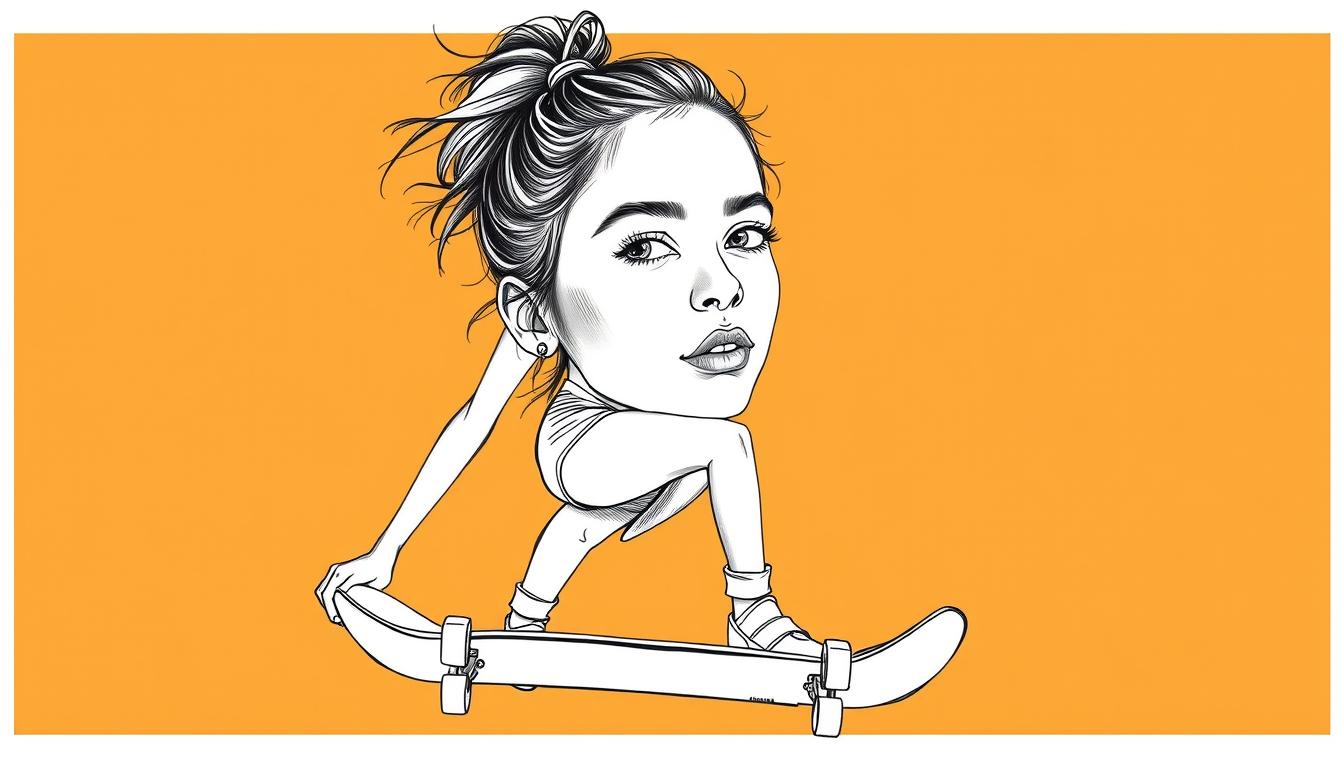A young woman in a fairy costume lands a perfect heelflip. This viral video introduced the world to a new kind of athlete. The girl became known as “Fadinha,” the Little Fairy.
That skateboarder is Jhulia Rayssa Mendes Leal. She grew up in Imperatriz, a city in northeastern Brazil. Her parents, Haraldo and Lilian, and her brother Arthur supported her unique path from the start.
Rayssa Leal turned a moment of internet fame into a legendary career. She won an Olympic medal before her seventeenth birthday. Her story shows how talent and opportunity can meet through sports and social media.
This Brazilian star now holds the number one global ranking in women’s street skateboarding. Her goofy-footed stance and fearless approach set her apart. She represents a generation that sees skateboarding as a premier Olympic sport.
Her journey from a viral sensation to a top-ranked champion is complete. It is a story of mental strength, consistent excellence, and cultural impact across continents.
Introduction: The Rise of a Skateboarding Prodigy
The 2021 Tokyo Games witnessed a seismic shift when a 13-year-old claimed her place in history. Standing on the podium with braces and a bronze medal, she redefined youth in competitive sports. This moment compressed decades of typical athletic development into just a few years.
Social media amplified her journey from backyard sessions to Olympic finals. Platforms that didn’t exist a generation ago turned local talent into global phenomenon. Her trajectory mirrors skateboarding’s own evolution from counterculture to Olympic sport.
Her visible joy and infectious enthusiasm separated her from athletes treating competition as business. This marked a turning point in how the world perceives young female athletes. The year became significant for every young skater who saw new possibilities.
| Athlete | Sport | Age at Medal | Year | Medal Type |
|---|---|---|---|---|
| Rayssa Leal | Skateboarding | 13 years, 203 days | 2021 | Bronze |
| Kyleigh Kühn | Swimming | 13 years, 267 days | 1936 | Gold |
| Dimitrios Loundras | Gymnastics | 10 years, 218 days | 1896 | Bronze |
| Klaus Zerta | Rowing | 13 years, 283 days | 1960 | Gold |
The Brazilian prodigy’s achievement resonated across continents. It demonstrated how talent meets opportunity through modern media channels. Her story continues to inspire a new generation of athletes worldwide.
Rayssa Leal: A Skateboarding Sensation
On the street course, her goofy-footed stance is a signature. It signals a run built on technical precision and creative flow. She commands attention from the first push.
This athlete made impossible tricks look effortless. Her approach to obstacles like handrails and stairs combined calculated risk with pure style. Judges consistently rewarded this blend of consistency and artistry.
Her medal collection spans the globe. It includes Olympic silver and bronze, X Games gold, and World Championship titles. A Pan American Games gold medal further cemented her status.
She transformed the perception of youth in skateboarding. It became an asset for progression, not a limitation. Her presence elevated every competition, drawing crowds eager to watch her compete.
The discipline of street skateboarding gained mainstream appeal. She made it accessible and thrilling for a new audience. Her influence turned a sport into a spectacle.
| Competition | Year | Location | Medal |
|---|---|---|---|
| Olympic Games | 2021 | Tokyo | Silver |
| X Games | 2022 | Chiba | Gold |
| World Skate Championships | 2023 | Rome | Gold |
| Pan American Games | 2023 | Santiago | Gold |
Early Life and Inspiration
In the northeastern Brazilian city of Imperatriz, a six-year-old girl received a gift that would chart her future course. The streets of Maranhão became her first training ground.
Childhood and Family Background
Haraldo and Lilian created an environment where skateboarding was encouraged. Their support formed the foundation for an unconventional athletic path.
The Mendes Leal household stood out from typical Olympic families. Brother Arthur watched his sister’s progression with pride. This tight family unit traveled together to early competitions.
Discovering a Passion for Skateboarding
At age six, a skateboard arrived as a gift from a family friend. The concrete became her canvas for self-expression.
Her passion grew organically through genuine love for the sport. She developed mental toughness by learning to fall and rise again. Those early years built the resilience needed for competition.
| Year | Age | Development Stage | Significance |
|---|---|---|---|
| 2014 | 6 years | First Skateboard | Received gift that started journey |
| 2015-2017 | 7-9 years | Skill Foundation | Mastered basic tricks and coordination |
| 2018 | 10 years | Local Competitions | First taste of organized skateboarding |
| 2019 | 11 years | Regional Recognition | Gained attention beyond Imperatriz |
This foundation in Imperatriz proved that great careers can start anywhere. Family support allowed natural talent to flourish without pressure.
The Viral Moment: From Tutu to Global Fame
A single video clip, sent with a mother’s hope, changed the trajectory of a young skateboarder’s life forever. It captured pure joy and raw talent in a way that resonated across the globe.
This moment separated a local passion from an international career.
The Heelflip Video That Captivated the World
On September 7, 2015, a seven-year-old executed a perfect heelflip down a set of stairs. She wore a bright blue tutu, creating a striking contrast between fairy-tale costume and technical skill.
Her mother, Lilian, filmed the trick. She then made a bold decision to send the video directly to Tony Hawk.
The skateboarding legend reposted it on Twitter the very next day. His comment, praising the “fairytale-style heelflip in Brazil,” gave the clip immense credibility.
That single social media post transformed a local talent into an international curiosity overnight. Algorithms amplified the video, introducing skateboarding to millions of new viewers.
The timing was perfect. Smartphone technology and social platforms had matured just enough to make this kind of instant, global fame possible.
This video launched the enduring nickname “Fadinha,” or Little Fairy. It became her origin story, demonstrating a personality that found equal joy in performance and precision.
Breaking Barriers in Competitive Skateboarding
The year 2019 marked a pivotal turn. At just eleven years old, the young skateboarder entered the elite arena of the Street League Skateboarding (SLS) World Tour.
She faced veterans with years more experience. Her journey from viral sensation to serious contender was complete.
Early Competitions and Landmark Achievements
In London, she earned a third-place finish with a solid score of 26.0. This result placed her above established stars like Letícia Bufoni and Alexis Sablone. It signaled a shift in the sport’s landscape.
Weeks later, in Los Angeles, she made history. Her first-place finish made her the youngest street skater ever to win a women’s SLS final.
This victory was decisive. She surpassed then-world number one Pamela Rosa, proving her skill was no fluke. It was a statement of genuine elite talent.
Her composure at the X Games that same year, finishing fourth, confirmed her mettle. She handled the pressure of skateboarding’s biggest stage without fear.
These early contests established her patterns: consistency, technical difficulty, and calm under pressure. Breaking barriers meant more than winning medals. It expanded what was possible for the next generation of girls worldwide.
Olympic Journey and Young Medalist Achievements
The Olympic podium had never seen a medalist quite like the braces-wearing 13-year-old from Brazil. Her presence marked a shift in what elite athletic achievement could look like.
Tokyo 2020: A Historic Silver
At the pandemic-delayed Tokyo 2020 Games, the young skateboarder carried Brazil’s hopes. She placed third in qualifiers, securing her final spot with consistent runs.
Her silver medal performance combined technical precision with visible joy. At 13 years and 203 days old, she became the youngest Olympic medalist in 85 years.
The Impact of Youth and Dedication
Youth became her advantage rather than a limitation. The fearlessness that sometimes fades with experience shone through every trick.
Social media response was immediate. She gained 5.8 million Instagram followers, unprecedented for a teenage athlete. The Visa Award recognized her sportsmanship with a $50,000 charity donation.
| Athlete | Sport | Age at Medal | Olympic Year | Medal Type |
|---|---|---|---|---|
| Rayssa Leal | Skateboarding | 13 years, 203 days | 2021 | Silver |
| Marjorie Gestring | Diving | 13 years, 268 days | 1936 | Gold |
| Kyleigh Kühn | Swimming | 13 years, 267 days | 1936 | Gold |
| Klaus Zerta | Rowing | 13 years, 283 days | 1960 | Gold |
Three years later in Paris, the bronze medal at age 16 made her Brazil’s youngest double Olympic medalist ever. Her journey demonstrated that age could redefine athletic excellence.
Dominating the Street League Skateboarding Scene
August 28, 2021, marked a turning point in women’s street skateboarding competition history. The Street League Skateboarding series became the ultimate proving ground where dominance was measured in championship titles and record-breaking scores.
Record-Setting Performances and High Scores
In Salt Lake City, the young athlete faced intense pressure. She needed an 8.3 rating to win the opening leg of the street league season. Instead, she delivered an 8.5—the highest women’s SLS score at that time.
This historic moment came from a kickflip-to-handrail combination. No woman had successfully landed this maneuver in official Street League Skateboarding competition before. The achievement demonstrated her ability to perform when stakes were highest.
Memorable Runs in International Competitions
The 2022 SLS Super Crown in Rio de Janeiro brought the championship to her home country. Brazilian fans watched her claim the title with consistent excellence across the entire series.
December 2023’s São Paulo SLS Super Crown produced another breakthrough. She scored her first-ever 9 rating during the run section. This made her the first woman to reach that mark in the Street League Skateboarding competition format.
Her league skateboarding victories accumulated across multiple seasons. Each championship reinforced her position at the top of competitive street skating rankings worldwide.
Triumphs at the X Games and Other Prestigious Competitions
April 2022 in Chiba, Japan, finally delivered the prize that had remained just out of reach. The X Games gold medal was secured against fierce competitors like Funa Nakayama and Chloe Covell. This victory was a pivotal moment, earning recognition from the core skateboarding community.
Winning this prestigious non-Olympic event meant more than just a title. It signaled a new level of dominance. The Chiba event became her territory, a fact she confirmed by returning to claim the gold again in 2023.
First X Games Gold and Subsequent Victories
This consistency extended far beyond a single venue. Podium appearances across multiple events showed her readiness to compete anywhere. Each gold medal represented validation from judges and peers.
The 2023 Pan American Games in Santiago added a major continental title. World Championship gold medals in Sharjah (2022) and Rome (2024) further proved her ability to peak for the most significant events. For Rayssa Leal, the podium became familiar ground, but each victory was met with genuine excitement.
These wins built a resume that transcended any single season. They established her as the standard to beat in women’s street skateboarding.
Innovative Skateboarding Techniques and Signature Tricks
The artistry of competitive skateboarding lies in how a skater connects difficult tricks into seamless runs. Technical precision separates good performances from great ones.
Exploring her Unique Skill Set
Her goofy-footed stance created a distinctive approach to street obstacles. This required spatial awareness adjustments that most skaters never face.
The back smith grind down Hollywood 16’s iconic handrail placed her among elite company. She conquered obstacles that others avoided.
Judges consistently rewarded her trick selection for its high difficulty level. Technical skateboarding demands mastering individual moves before combining them.
Scoring Highlights and Game-Changing Moves
The kickflip-to-handrail combination in Salt Lake City earned a record 8.5 score. This became a signature moment in her career.
Her historic 9-rating run in São Paulo showcased seamless transitions between obstacles. It demonstrated complete run construction rather than isolated tricks.
Younger competitors study her approach as the current standard. Innovation comes from executing established moves with higher consistency on challenging terrain.
Overcoming Challenges with Mental Strength and Support
Behind the medals and viral clips lies a battle fought not on concrete, but in the mind. For a young athlete, mental obstacles can be more daunting than any physical trick. This was a reality she confronted head-on.
The decision to work with a sports psychologist marked a pivotal shift. It addressed fears that technical skill alone could not conquer.
The Role of Sports Psychology
She was candid about her struggles. “I was so scared of contests,” she revealed, “always thinking, ‘But what if I don’t do well?'” This anxiety created an internal battle before each event.
A fear of high obstacles was another barrier. She knew she had the physical ability, but her mind would whisper “don’t try.” Her psychologist helped unblock these patterns.
After nearly a year of consistent work, she called it one of the best things to happen in her athletic career. This dedicated time built a foundation of mental resilience.
| Mental Challenge | Psychological Strategy | Competitive Outcome |
|---|---|---|
| Fear of failure in contests | Reframing pressure as opportunity | Increased risk-taking in runs |
| Anxiety about obstacle height | Visualization and gradual exposure | Confidence to attempt harder tricks |
| Self-doubt (“What if I don’t do well?”) | Focusing on process over results | Improved consistency under pressure |
Conquering Fears and Competition Anxiety
The work translated directly to her performance. Contests became less about proving herself and more about executing her preparation. This removed a heavy mental weight.
Her openness about seeking help has been significant. It normalizes mental health support for young athletes everywhere. Leal’s journey shows that true strength includes asking for help.
Media Impact and Global Fan Engagement
Her Olympic silver medal did more than change a record book. It sparked a digital phenomenon. Almost six million new Instagram followers arrived in just days.
This connection turned an athlete into a global icon. Her reach extended far beyond core skateboarding fans. Mainstream audiences who had never watched the sport now knew her name.
Social Media Buzz and Viral Moments
The famous tutu video was just the start. Sustained engagement came from her genuine personality. She remained joyful and accessible, a rarity at the elite level.
Her media appearances balanced authenticity with clear professionalism. She never lost the enthusiasm that made her so relatable to people of all ages.
Inspiring the Next Generation of Skateboarders
Young girls across the world saw themselves in her story. They asked their parents for skateboards after watching her compete. Her impact created measurable increases in participation rates for women.
Rayssa Leal embraced being a role model. “I’m really happy to be an inspiration,” she said, “not just to people my age, but to people older than me as well.”
Parents who might have discouraged skateboarding reconsidered. They saw her success and evident joy. Her influence proved the sport had no age limit.
Growing Presence in Video Games and Popular Culture
Cultural recognition reached a new dimension as the skateboarder transitioned from real-world competitions to virtual gameplay. This expansion beyond traditional sports media marks a significant milestone in her career.
Inclusion in Tony Hawk’s Pro Skater Remastered
The 2025 remake of Tony Hawk’s Pro Skater 3 + 4 will feature Leal as a playable character. This represents full-circle recognition from the legend who first shared her viral video.
Tony Hawk’s series introduced skateboarding to millions decades before she picked up a board. Now players worldwide can choose her character and learn her story through interactive gameplay.
Broadening Her Influence Beyond Skateboarding
Video game inclusion extends her reach far beyond competition viewers. Casual gamers encounter her in their living rooms, introducing skateboarding to new audiences.
This crossover cements her status as more than an active athlete. She becomes a cultural figure representing possibility and joy to generations who might never visit a skatepark.
The digital presence ensures her influence outlasts competitive years. Future players will discover Rayssa Leal through gameplay, keeping her story alive in popular culture.
Rayssa Leal in Major International Events
The global championship circuit is a relentless test of consistency. It demands peak performance across continents and cultures.
Success Across Global Championships
World Skate championships became a regular proving ground. Her first world championship gold came at the Sharjah event in 2022, cementing her place at the top.
This victory began a remarkable streak. She secured a silver in Tokyo in 2023 and returned to Rome in 2024 to claim another gold. This progression showcased her sustained excellence on the biggest stages.
| Championship | Year | Location | Medal |
|---|---|---|---|
| World Skate | 2021 | Rome | Bronze |
| World Skate | 2022 | Sharjah | Gold |
| World Skate | 2023 | Tokyo | Silver |
| World Skate | 2024 | Rome | Gold |
Notable Performances in Pan American and World Events
Beyond the world championship circuit, other events defined her career. The Pan American Games in Santiago delivered a gold medal for Brazil.
Street League contests in Los Angeles and Salt Lake City tested her against top American talent. A historic score in a Salt Lake City women final broke records.
Competitions in Rio de Janeiro carried the weight of home expectations. Rivalries with athletes like Pamela Rosa pushed every women street final to a higher level. Each event added to a legacy built on global consistency.
Experiencing the Thrill: Daily Training and Lifestyle
Training sessions feel more like playground adventures than work for this champion. The balance between serious preparation and genuine enjoyment defines her approach to skateboarding. This mindset keeps the sport fresh even at the highest competitive level.
A Glimpse Into Her Rigorous Regimen
Her daily routine blends technical drills with creative freedom. Structured practice focuses on perfecting competition tricks. Unstructured sessions allow for spontaneous creativity without pressure.
Physical conditioning extends beyond the skateboard. Strength training and flexibility work prevent injuries. Recovery time gets careful attention between events.
She describes her philosophy simply: “It’s like I’m in an amusement park and I’m just having fun. Because I am doing what I like and what was my dream to always do. So just getting to championships and being with my family and with my friends is great.”
Family presence during travel provides grounding amidst global fame. Friends include both fellow skaters and normal teenage companions. This social balance maintains perspective.
The demanding schedule requires discipline but feels like pursuing dreams. Time management becomes crucial for balancing elite athletic demands with teenage experiences. This approach separates her from athletes who treat training as mechanical repetition.
The Future of Street Skateboarding and Upcoming Events
A bronze medal at the Paris 2024 Olympics carried a different weight than the initial silver. It signaled a new phase of maturity and confirmed a lasting legacy.
The pressure of defending her Tokyo success was immense. Yet, she competed with a clean focus, free from the need to prove herself on the world stage for the first time.
Anticipating the Paris 2024 Olympic Journey
At 16 years old, the athlete made history at the Paris 2024 Games. She became Brazil’s youngest ever double Olympic medalist across all sports.
This outcome solidified street skateboarding’s place in the Olympic program. Athletes like her make the sport compelling television for a global audience.
Her world number one ranking in December 2024 positions her as the definitive athlete to beat. The sport evolves rapidly, with each generation pushing trick difficulty to new heights.
Future events will test if she can maintain dominance into her late teens and twenties. The Paris 2024 performance was both an achievement and a stepping stone.
The Olympics return in 2028 to Los Angeles. Rayssa Leal will compete there at age 20, armed with even more experience. Her future in the street discipline appears limitless.
Signing Off: Celebrating a Trailblazing Journey
What began as a young girl’s dream in Imperatriz became a blueprint for the next generation of athletes. Rayssa Leal’s journey shows how viral moments can launch lasting careers. Her story proves that age is no barrier to excellence.
The bronze medal in Paris, combined with Tokyo silver, cemented her legacy. This skater’s influence on women in the sport extends far beyond statistics. Each competition run demonstrated fearlessness and pure joy.
Family support provided stability throughout her remarkable rise. Young athletes worldwide now reference her career when dreaming big. Her impact continues to shape the future of street skateboarding.




